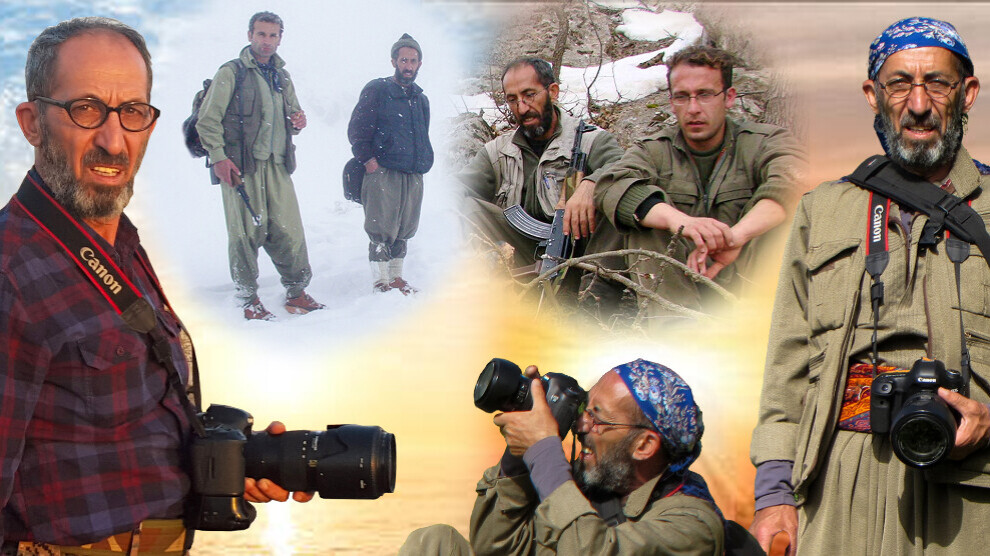Seyit Evran, the memory of the Free Press
Journalist and author Seyit Evran, who was considered a mainstay of the Kurdish press, died at the age of 54 from a serious heart disease.
Journalist and author Seyit Evran, who was considered a mainstay of the Kurdish press, died at the age of 54 from a serious heart disease.

Kurdish journalist and author Seyit Evran died on 22 September at the age of 54 in a hospital in North-East Syria as a result of heart disease.
In a press statement in front of the Mihemed Şêxo Culture and Art Center in Qamishlo on Monday, the Free Media Association (YRA) said the following:
"With Seyit Evran, we have lost the memory of the free press. For thirty years he was a tireless militant on this honourable and invaluable path. His passion for enlightening societies and his determination to fight enabled him to overcome all obstacles and difficulties. With his attitude, his actions and his pen, he took a firm place in the pages of the free press.

Seyit Evran had a great influence on journalism in the tradition of the free Kurdish press. Born in 1969 in the Hênê district of Amed (Diyarbakır), his rebellious spirit was formed in his parental home, which had been shaped by the resistance of Şêx Seîd. Evran's grandfather was a comrade-in-arms of the leader of the uprising. He encountered the Kurdish liberation movement as a youth. As a student at Çukurova University in Adana, he met Gurbetelli Ersöz (a guerrilla fighter, who died in the "Southern War" in 1997, was instrumental in building up the Kurdish press and became the first woman editor-in-chief in Turkey at the newspaper Özgür Gündem).
The years when people were afraid to read newspapers
Deeply impressed by the press work under the vanguard of Gurbetelli Ersöz, Seyit Evran joined the Kurdish liberation movement in Amed in 1990. He became active in journalism at a time when the Turkish state's attacks on the people of Kurdistan were at their most extreme, Kurdish media workers were being extra-legally executed in the middle of the street and the scorched earth policy was at its height. When the three editorial offices of the newspaper "Özgür Ülke" were bombed in Istanbul, Ankara and Amed on 3 December 1994, Seyit Evran was among the 23 people injured.
Those were the years when many people in Kurdistan and Turkey were afraid to read newspapers. Seyit Evran felt no fear. His love for truth and freedom was stronger, so that in his reporting on massacres and other crimes against the Kurdish people, he also risked his own death again and again. He went to the mountains to write about the reality of the liberation struggle. Following in the footsteps of pioneers like Gurbetelli Ersöz, he spent years researching the life and struggle of the guerrillas and communicating it to the Kurdish people and the world. He wrote countless articles on scientific, historical and literary topics and made important contributions to the Free Press Archive. He later traced this path for his book "Journey to the Edge of Life".
One of the pillars of the Rojava revolution
Seyit Evran worked for ANF for years. He was not only active as a journalist in Kurdistan, but also in other countries. In Armenia and Russia, for example, he researched the situation of the Kurdish communities there and well-known personalities in those regions. He turned his attention to practically every place with Kurds where there was revolutionary activity. In 2012, when Rojava was gripped by revolution, he went there. On the one hand, he wrote about the reality of the uprising in Rojava. On the other hand, he played a leading role in building the press structures. From Dêrik to Afrin, he travelled throughout the region, following the revolutionary process and training dozens of journalists at the same time. With this work, he became one of the pillars of the Rojava revolution and the revolution of the press.
Seyit Evran had been struggling with health problems since 2020. He suffered two heart attacks and had to undergo several operations. Nevertheless, he continued his work with unbroken enthusiasm and morale. Recently, however, he suffered a relapse that took a toll on his body. Since then, he has been in hospital.
Unfortunately, despite all his efforts, his heart stopped on the morning of 22 September. Seyit Evran, just like Apê Musa, Gurbetelli Ersöz, Halil Dağ, Nûjiyan Erhan, Deniz Fırat, Dilîşan Îbîş and dozens of other free press fighters, was a torch that lit our way for truth and freedom. He has left a great legacy with his work. We, the successors of this tradition, promise to extend and expand this struggle and this truth. Their path will always enlighten us and lift our consciousness."